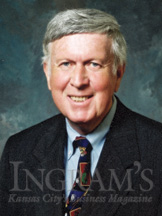by sen. harry wiggins
The Tragic Loss of the KC Stadium Bill

On May 17, 2002, after two years of
planning and work, building a coalition of votes to enact legislation
to provide funding for the security, modernization and updating of Truman
Sports Complex, I saw my hopes and dreams crash. They crashed because
of the refusal of the Missouri House of Representatives to take the bill
up for debate and a vote in the waning moments of the legislative session.
How could this happen?
During the last 28 years, I have done everything I could to promote Kansas
City in general and especially the sports image of my native city. The
first bill to provide state assistance was drafted by me in 1990 at the
request of then Mayor Pro Tem Emanuel Cleaver, providing $2 million per
year for Truman Sports Complex and $2 million for Bartle Hall.
It became apparent in 1994 that the Sports Authority here might not be
able to meet its obligations under the terms of the leases for financial
reasons. A default would be disastrous. Fred Dreiling, my administrative
assistant, and I met alone with the late Gov. Mel Carnahan for two hours
and convinced him to increase funding for Truman Sports Complex to $3
million per year, where it stands today.
In 2001, with the full support of David Glass and Lamar Hunt, Fred Dreiling
and I drafted a bill allowing the Royals and Chiefs to retain sales-tax
receipts for additional maintenance. The bill did not pass, but it was
the beginning of our statewide coalition.
Early one morning in June 2001, Gov. Holden called me to say he was going
to St. Louis to endorse state aid for a new Cardinals baseball stadium
plus a ballpark village. I told him Kansas City had to be a part of this
or nothing would pass, and he quickly came around to my point of view.
Every television station and news outlet in Kansas City was in my front
yard that June afternoon when I announced, as the senior senator from
Kansas City, that Kansas City would get equal or more or there would be
no bill. That became our motto, and it carried through the entire session.
I acquired a strong and unusual ally in Senator Peter Kinder, a conservative
Republican from Cape Girardeau, the president pro tem of the Senate. He
agreed to handle the St. Louis portion of this year’s bill. This
was a perfect alliance, balancing the bill geographically and politically.
The bill sailed through a Senate committee hearing and cleared the Senate
Budget Control Committee before we took it up on the Senate floor for
perfection. Our coalition worked. After a day and a half, the Senate adopted
the Bill 19-14 and sent it to the House by the same vote.
What happened in the House and its failure even to take up the bill will
be a matter of conjecture for years to come. I never served in the House,
and it is not my style to cast aspersions and blame. The positive aspects
are that the House Commerce Committee held a timely hearing, chaired by
Rep. Henry Rizzo, where Sen. Kinder and I testified before a jam-packed
room of supporters. That committee voted the bill "do pass"
to the House floor, where it was referred to the Fiscal Oversight Committee,
at which hearing the chair person abruptly walked out. Then a favorable
vote was taken, but the vote’s legality was questioned. By then,
every hour became critical.
What happened in the House was not the fault of the Royals and Chiefs
nor any of Kansas City’s interests nor of the Senate. For this project
to go forward now will require many things, including a new coalition.
A new bill has to be drafted, which I have offered to do as a favor for
David Glass, since I will continue to have the ability to do this through
the fall. The new coalition will then have to ensure that there is strong
and unswerving leadership in the House to move the bill and pass it.
Beginning in January, my office was used as a gathering place for all
the supporters of the bill. Fred Dreiling chaired meetings every Tuesday
morning to discuss the week’s programs and the progress being made.
The crowds grew to as many as 30 from across the state during April and
May. Plenty of promises were received from the House that the bill would
move. For some reason, those promises were not fulfilled.
The losers were the people of Kansas City and elsewhere. I am sorry.
Sen. Harry Wiggins is now a full-time attorney with Blackwell Sanders
Peper Martin LLP.